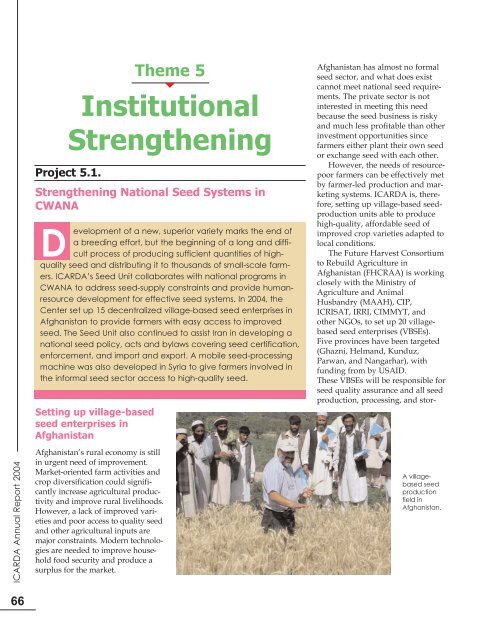ICARDA annual report 2004
ICARDA annual report 2004
ICARDA annual report 2004
Create successful ePaper yourself
Turn your PDF publications into a flip-book with our unique Google optimized e-Paper software.
<strong>ICARDA</strong> Annual Report <strong>2004</strong><br />
66<br />
Project 5.1.<br />
Institutional<br />
Strengthening<br />
Strengthening National Seed Systems in<br />
CWANA<br />
Setting up village-based<br />
seed enterprises in<br />
Afghanistan<br />
Afghanistan’s rural economy is still<br />
in urgent need of improvement.<br />
Market-oriented farm activities and<br />
crop diversification could significantly<br />
increase agricultural productivity<br />
and improve rural livelihoods.<br />
However, a lack of improved varieties<br />
and poor access to quality seed<br />
and other agricultural inputs are<br />
major constraints. Modern technologies<br />
are needed to improve household<br />
food security and produce a<br />
surplus for the market.<br />
Theme 5<br />
D<br />
evelopment of a new, superior variety marks the end of<br />
a breeding effort, but the beginning of a long and difficult<br />
process of producing sufficient quantities of highquality<br />
seed and distributing it to thousands of small-scale farmers.<br />
<strong>ICARDA</strong>’s Seed Unit collaborates with national programs in<br />
CWANA to address seed-supply constraints and provide humanresource<br />
development for effective seed systems. In <strong>2004</strong>, the<br />
Center set up 15 decentralized village-based seed enterprises in<br />
Afghanistan to provide farmers with easy access to improved<br />
seed. The Seed Unit also continued to assist Iran in developing a<br />
national seed policy, acts and bylaws covering seed certification,<br />
enforcement, and import and export. A mobile seed-processing<br />
machine was also developed in Syria to give farmers involved in<br />
the informal seed sector access to high-quality seed.<br />
Afghanistan has almost no formal<br />
seed sector, and what does exist<br />
cannot meet national seed requirements.<br />
The private sector is not<br />
interested in meeting this need<br />
because the seed business is risky<br />
and much less profitable than other<br />
investment opportunities since<br />
farmers either plant their own seed<br />
or exchange seed with each other.<br />
However, the needs of resourcepoor<br />
farmers can be effectively met<br />
by farmer-led production and marketing<br />
systems. <strong>ICARDA</strong> is, therefore,<br />
setting up village-based seedproduction<br />
units able to produce<br />
high-quality, affordable seed of<br />
improved crop varieties adapted to<br />
local conditions.<br />
The Future Harvest Consortium<br />
to Rebuild Agriculture in<br />
Afghanistan (FHCRAA) is working<br />
closely with the Ministry of<br />
Agriculture and Animal<br />
Husbandry (MAAH), CIP,<br />
ICRISAT, IRRI, CIMMYT, and<br />
other NGOs, to set up 20 villagebased<br />
seed enterprises (VBSEs).<br />
Five provinces have been targeted<br />
(Ghazni, Helmand, Kunduz,<br />
Parwan, and Nangarhar), with<br />
funding from by USAID.<br />
These VBSEs will be responsible for<br />
seed quality assurance and all seed<br />
production, processing, and stor-<br />
A villagebased<br />
seed<br />
production<br />
field in<br />
Afghanistan.



